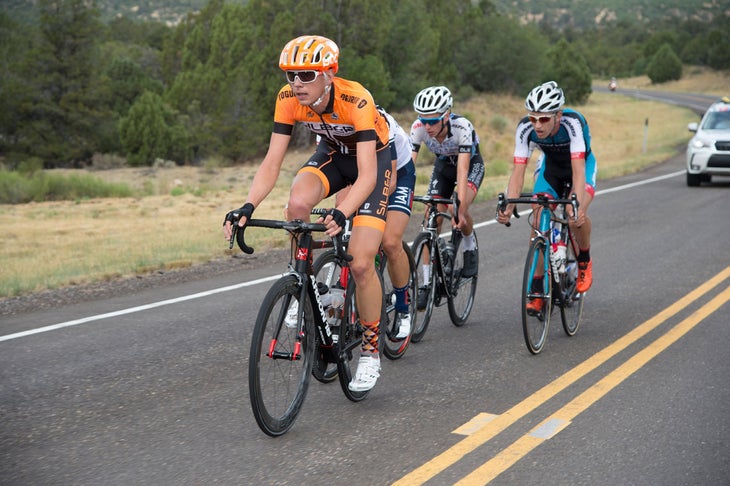On Monday night, after its sprinter Kris Dahl won the opening stage of the Tour of Utah, Canada’s Silber cycling team raised a few glasses of champagne at its dormitory in Cedar City. After the short toast, the team went back to planning its defense of the yellow jersey and its goals for the race.
“There was a little celebration, then we switched the channel,” said team owner and founder Scott McFarlane. “[Dahl]’s win is indicative of the way we’ve been planning.”
Silber’s short-term plan is to consistently punch above its weight class at the biggest races in the United States and Canada. As one of the youngest and smallest Continental teams on the circuit, Silber’s plan is easier said than done. But so far, the plan is going swimmingly.
The team is one of the strongest in the National Racing Calendar, alongside Axeon Hagens Berman and Rally. It sits atop the team rankings in the UCI Americas Tour, with riders Ryan Roth and Benjamin Perry ranked third and 10th, respectively. And Silber’s ability to win stage races and one-day events makes it a threat at any race, even the Tour of Utah.
In April, the team’s GC strongman Matteo Dal-Cin won the overall at the Redlands Bicycle Classic, before youngster Nigel Ellsay finished a close second at the Joe Martin Stage Race. In May, Alex Cataford finished second at the Tour of the Gila. Ryan Roth won the Winston-Salem Classic, and the team went 1-2 at Quebec’s GP Saguenay.
“This whole season has been one of seeing investment paying off on these young guys,” said Gord Fraser, the team’s sport director. “They take opportunity by both hands.”

The results will undoubtedly help with Silber’s long-term plan as well. McFalane hopes to grow the team into Canada’s unofficial development squad, where the country’s top up-and-coming talent go to try and reach the WorldTour. And he wants the Silber program to withstand the often topsy-turvy financial world of North American cycling.
Again, it’s a goal that’s easier said than done. In the U.S. domestic scene, Continental teams come and go faster than the latest cycling kit trends. Longevity depends almost entirely on the financial commitments of cash sponsors.
Silber has an advantage, however. According to McFarlane, the team has three-year financial commitment from its financial backer, Arthur Silber. That commitment, McFarlane said, will allow him to build a steady sponsorship portfolio to help boost the team’s budget.
“For the next two years, the goal is to stabilize the business operations,” he said.
McFarlane built the team out of his Montreal-based coaching company, Toguri Training Systems. He trains both elite and age-group cyclists, and says that Arthur Silber was a client. Silber agreed to back the team as a behind-the-scenes investor, McFarlane said.
In 2014 McFarlane brought on Fraser, who was a veteran of the domestic cycling scene. The squad also recruited Canadian veteran Roth, as well as talented amateur Dal-Cin, who had finished eighth at the 2013 Canadian time trial championships.
In 2015 the team won a stage of the Tour de Beauce, as well as the GP de Saguenay. They learned how to compete together, McFarlane says. Unlike other pro squads, where riders come and go, Silber has had the same core group of riders for the last two seasons.
McFarlane hopes that more results at the Tour of Utah and September’s Tour of Alberta help attract sponsors, and help attract the attention of WorldTour teams. After all, that’s Silber’s most substantial long-term plan.
“We want to be the program where riders are dying to come race with us,” McFarlane said. “We want riders to move through us on their way to [the WorldTour] ranks.”